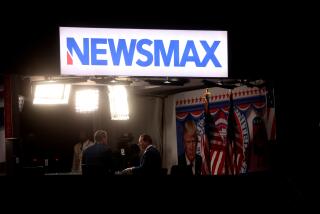Judge Says Investor Web Chat Is Not Libel
- Share via
The legal tactics of Global Telemedia International Inc. in an Internet libel case prompted a federal judge to rebuke the Newport Beach company, invoking a law that protects public interest advocates from corporate bullying.
U.S. District Judge David O. Carter in Santa Ana dismissed Global Telemedia’s defamation suit against two investors who allegedly posted disparaging comments on Raging Bull, a financial bulletin board on the Web. The judge also found the libel action was a SLAPP suit, or “Strategic Litigation Against Public Participation.”
The judge ordered the software maker to pay the investors’ legal fees, said their lawyer, Megan Gray. The ruling extends a law--initially meant to shield environmentalists from legal harassment--to the world of Internet chat rooms, where participants trade stock tips and a negative rumor can send shares plummeting.
“A publicly traded company is of public interest because its successes or failures will affect not only individual investors, but in the case of large companies, potentially market sectors or the markets as a whole,” Carter wrote in his 11-page ruling, which was issued Friday.
The decision may not create a precedent for other cases because it was written by a trial judge, not an appellate judge, UCLA law professor Eugene Volokh said. Still, Carter’s imposition of a SLAPP penalty on Global Telemedia may give other companies pause before they file similar suits, he said.
“A lot of these suits are filed to get access to the discovery process” to find the authors of anonymous Internet statements, Volokh said. Carter’s ruling may up the ante for companies seeking such information.
The decision represents the first time a court has held that Internet message boards devoted to discussions about a publicly traded company “are indeed connected with a public issue and fully protected under anti-SLAPP provisions,” said Gray, an attorney with Baker & Hostetler.
Global Telemedia’s lawyer could not be reached to comment.
The company’s stock, which traded as high as $16.57 last March 7, closed Tuesday at 22 cents a share, off 1 cent a share, in over-the-counter trading.
More to Read
Inside the business of entertainment
The Wide Shot brings you news, analysis and insights on everything from streaming wars to production — and what it all means for the future.
You may occasionally receive promotional content from the Los Angeles Times.










